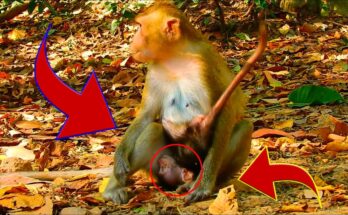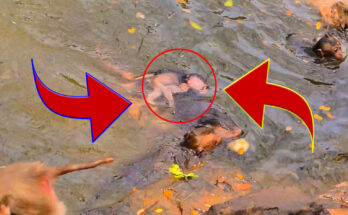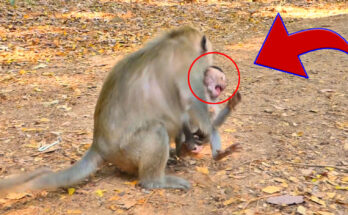Monkeys, with their playful nature and curious behaviors, have always fascinated humans. From the vibrant jungles of Africa to the dense rainforests of Southeast Asia, monkeys are known to engage in a variety of playful activities. Their love for play is a characteristic that is common across many primate species, especially the newborns. But why do newborn monkeys sometimes bite when they’re playing around? The answer to this question lies deep within their instincts, their communication methods, and their need for socialization.
In the early stages of life, monkeys, like most mammals, rely on their innate behaviors to learn about their environment. For newborn monkeys, the world is a place filled with mystery, and everything they encounter is an opportunity for exploration. Their mother or caregivers play a crucial role in guiding them through this process, but one of the first lessons they must learn is how to interact with others, both their own species and, sometimes, humans.
Biting in newborn monkeys, particularly during play, is a natural instinct that serves several purposes. First and foremost, it is a form of communication. Like humans, monkeys have a complex system of non-verbal cues, including body language and facial expressions. A bite, although seemingly aggressive, is often a playful gesture. In the wild, young monkeys often bite their playmates gently as part of their social interactions. This behavior is typically harmless and is used to establish boundaries, initiate play, or test their strength. Newborn monkeys are constantly learning the difference between what is acceptable and what is not in their social groups.
Play is an essential part of a young monkey’s development. It helps them develop motor skills, learn how to navigate their environment, and build social bonds. When playing with humans, these young monkeys may not fully grasp the nuances of human interactions. For them, play may look similar to how they interact with their peers in the wild. If they bite a human during play, it is often because they are testing their environment and seeing how people will respond to their actions. A human’s reaction—whether it be laughing, pulling away, or even scolding—teaches the monkey what behaviors are acceptable and which are not.
Monkeys are highly intelligent creatures. Their ability to mimic and learn from the behaviors of others is unparalleled in the animal kingdom. This is why newborn monkeys are so quick to adapt to their surroundings and why they often engage in behaviors that seem both cute and chaotic. When a monkey bites during play, it is often an attempt to engage with their playmate, whether it’s a fellow monkey or a human. The bite may be accompanied by other playful behaviors like jumping, chasing, or grabbing, all of which are forms of social engagement.
Another reason for biting during play is that monkeys have sharp teeth that are well-suited for their diet. While they primarily consume fruits, leaves, and insects, newborn monkeys have not yet fully developed the skills to regulate their bite force. As a result, they may bite more forcefully than intended, causing a sudden surprise to their human playmates. The bite, in this case, is more of an accidental side effect of their play rather than an aggressive act.
In the wild, newborn monkeys are constantly learning how to interact with their peers, and the act of biting helps them practice social rules. These rules are critical for the survival of the group. A young monkey who doesn’t learn how to regulate their biting may find themselves excluded from social interactions or face more aggressive responses from older monkeys. In the context of human interaction, the biting behavior can be confusing for both the monkey and the human. Humans, unlike monkeys, typically don’t view biting as a form of play. However, in the animal kingdom, biting during play is a common and natural behavior.
As humans, we often forget that we share many similarities with our primate relatives. The act of play, even when it involves a bite, is simply a part of how animals learn about the world around them. For a newborn monkey, the excitement of playing with humans might be overwhelming, and their response to this excitement may come out in unexpected ways, like biting. Understanding this behavior requires patience and an appreciation of the natural instincts that drive it.
In conclusion, the playful bite of a newborn monkey is a natural part of their development and socialization. It is an expression of their curiosity and a way to explore the world around them. While it may be startling or uncomfortable for humans, it is important to recognize that biting is not meant to be harmful. It is simply a monkey’s way of engaging with their environment. So, the next time a newborn monkey nibbles at your fingers during play, remember that it’s just a part of their learning process, and their love for play is one of the many ways they connect with the world.


